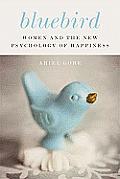
“Good books, like good friends, are few and chosen; the more select, the more enjoyable.” -Louisa May Alcott
I was born with a book in my hand. Okay, not really. But I’ve been reading for as long as I can remember, and then some. I used to read a couple of books per week, but in the year 2010 (a crazy one for me) I was lucky if finished one book every few months. Now, I know there’s no such thing as “normal” and “regular,” but this definitely wasn’t my normal. As someone who was once wealthy in book knowledge, I was seriously lacking in the literature department.
Louisa May Alcott was a brilliant writer and an extremely progressive woman for her time. I’ve always admired her, which is why I decided to act on her quote above. I recently took matters into my own hands and read a book titled Bluebird: Women and the New Psychology of Happiness. Not even Alcott could have predicted how meaningful Bluebird would become to my life after devouring it in mere hours.
Literature on psychology usually isn’t my strong suit, but allowing myself to step outside of my comfort zone and be challenged to read a varying subject matter served as a critical tool in my new found perception of happiness. This collection of words by Ariel Gore really woke me up and affected me; it shook me to my core. I have a complicated thought process when it comes to fate and everything happening for a specific reason, but it definitely wasn’t a coincidence that this book came into my life with such precise timing. (Full disclosure: I have nothing but amazing words to describe this book.)
Women and happiness isn’t exactly the simplest issue to tackle, especially within the realm of 190 pages. The author manages to provide a plethora of insight and statistical information that helps the reader grasp the all-encompassing concept of feminine satisfaction. She discusses ideas of motherhood, the culturally historical origins of women and happiness, positive emotion, and imperfection. While there are many components involved in achieving the ideal level of happiness, it ultimately remains within the steps we take as individuals during our search. Gore explains this in the conclusion of the book on page 176,
“Happiness, like some central seed, is actually contained within the pursuit.”
The author strategically and effectively covers her bases in terms of research, yet she strikes the difficult balance of incorporating her own story. The fusion of a personal narrative in a critical piece isn’t always the best idea, but I think this was a smart choice for this book specifically. When dealing with the complicated issue of females and their psychological satisfaction and happiness, a personal narrative is almost necessary.
Ariel Gore takes the reader through her own mental journey of creating happier spaces in her life, in many ways that I decided to replicate as a result of my own need. The idea of a happiness journal in itself is fascinating. My own experiences with journals and diaries have proven to be the direct opposite; I use this space as a means of venting my deepest frustrations, anger, and sadness. Looking back on my old, hand-written journal entries never serves as a positive reinforcement and is rarely enlightening. It never occurred to me to utilize my journals as a space to discuss and analyze primarily happy moments. Gore argues that by writing down our sources of genuine happiness we come to terms with what makes us content, and in turn we perpetuate these occurrences. Putting positive energy into journals and our own thoughts will yield happier results in everyday life.
What was most encouraging about reading Bluebird was the very message I had been looking for all along. Gore writes on page 137,
“Sometimes I think we’re all just so afraid of life—of both youth and age. We’re afraid to change, afraid to make choices, afraid to say, ‘This is the year.’ We thought the years would brig a sense of security a sense of clarity, but there is no year when a risk doesn’t take courage.”
This directly relates to my Walk a Mile in Her Shoes project, and my current state of being. For the past year of my life I had been almost waiting in limbo for everything to just fall into place on its’ own; I was afraid of taking the next steps to really make 2010, or 2011, “the year.” My 30-day blogging project is a response to my initial fear of attaining personal happiness, and I felt like Ariel Gore was specifically talking to little old me on page 137. I think this is a very relatable issue for so many young women, and one of the key moments in Bluebird for readers to reflect on and understand.
Krystie also blogs at Not A Barbie Girl

